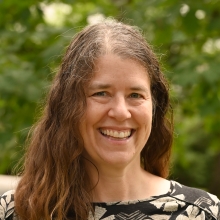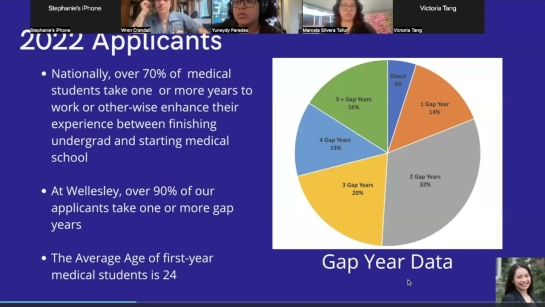Resources for Underrepresented Students and Alumnae Applying to Health Profession Schools

A crucial topic in healthcare today is how to eliminate inequities in the quality and availability of medical care for ethnic, racial, social, and economic minorities. There is an urgent need to increase both the diversity and cultural competence of our health care workforce.
Post-Baccalaureate Planning

The words “post-baccalaureate” refer to what you will do after you’ve graduated from college. In the health professions world, it is often used to refer to how someone might improve her chances for admission to a health professions school.
Waiting to Apply to Health Profession Schools: Taking a Gap Year (Or More)

Trying to balance academics, clinical experiences, community service, research, other extracurricular activities, hobbies, and relationships? Not feeling ready to prepare for your standardized test for admission to health professions schools or to tackle the application process? Not absolutely sure of your career path? Have something you want to explore? Think about taking time (a “gap,” “bridge,” “opportunity,” or “glide” year or years) between completing your undergraduate education and entering health professions school.
Finding Summer Opportunities

Summers are a great time to explore interests. There are a vast number of opportunities to learn about and prepare for careers in the health professions.
Joint / Combined / Dual / Double Degree Programs (Health Professions)

Many universities and health professions schools now offer the opportunity to earn more than one degree in joint/combined/dual/double degree programs. Individual institutions use these terms in different ways, so read the descriptions and outcomes on individual websites carefully as you compare programs. Work closely with your advisors, mentors, and faculty to decide if a dual degree program is necessary to meet your career goals.
Gaining Research Experience for Health Professions Schools

Got a question you want to try to answer, or an idea to explore? Having a research experience can teach you skills of academic inquiry beyond what you can learn in the classroom. It is an opportunity to be curious, inventive, and creative. It will allow you to engage in a particular subject in great detail. If you enjoy the experience, you may want to consider making research a part of your career planning.
Gaining Service Experience for Health Profession Schools

Becoming a health professional requires a true dedication to serving others. Often health professionals are asked to put the needs of their patients ahead of their own. Health professions schools want to see that applicants care enough for others that they are willing to volunteer their time to help them. They will be interested in seeing evidence of your service to your community since high school.
Gaining Clinical Experience for Health Professions Schools

It is critical that you gain actual experience in a healthcare setting with healthcare professionals and patients before you make a decision about your future career. You need to be aware of the responsibilities, rewards, and challenges that you will face as a health professional. You also must begin to learn to feel comfortable working with people from all walks of life, whether as patients or as members of the health care team.
What If My Grades Aren't Strong?

First and foremost, you do not need to have all A grades to be accepted into a health professions school. But schools will want to see evidence of ability in the sciences and strong study skills that will allow you to succeed in a graduate academic environment.
Transcripts for Health Profession Schools

Every health professions school will require official copies of your transcripts as a part of the application process. Pay close attention to information regarding how, when, and to whom you should send your transcripts. Watch application deadlines and delivery dates. Be sure to request transcripts from all undergraduate institutions attended. Note that problems with transcripts are the number one cause of processing delays and missed application deadlines.
Studying Abroad (Health Professions resource)

Health professions schools are interested in individuals who are broadly educated. Experiences such as study abroad may be particularly useful if you learn about and immerse yourself in the culture and people of the country in which you study.
Health Professions Networking: Wellesley Student and Alumnae Organizations

One of the best ways to learn about careers in the health professions is to talk with Wellesley students and alumnae. We strongly encourage you to join an organization that aligns with your interests. Some of our local, regional, and national organizations are listed below in alphabetical order. Don't see a student organization that reflects your interests? Start one!
Health Profession Schools: Which Courses Should I Take?

Health professions schools establish their own individual admission requirements. This resource provides an overview of commonly required courses for health professions schools, advice for planning your schedule, and other academic advising information.
Preparing to Apply for Health Professions School: Gaining Competencies

There are many things health professions schools will take into account when they review your application.
Discounted Test Preparation Resources for the MCAT and DAT

Health Professions Advising is pleased to offer students and alums a discount on common test prep products, including Princeton Review, AAMC Prep Bundle, DAT Bootcamp, & UWorld MCAT Prep.
Speech-Language Pathology

Speech-language pathologists (SLPs) are healthcare professionals who diagnose and treat people with speech, language, communication, and swallowing disorders. They work with patients from all stages of life, including newborn babies with nursing difficulties, elementary school children with disabilities, adults with brain damage, and elderly people with dementia.
Physician Assistant

Physician assistants (PA) are medical professionals who diagnose illness, develop and manage treatment plans, prescribe medications, and often serve as a patient’s principal healthcare provider. Having thousands of hours of medical training, physician assistants are both versatile and collaborative and they can practice in every state and in every medical setting and specialty, improving healthcare access and quality.
Physical Therapy

Physical therapists (PTs) are healthcare professionals who treat people with injuries, illnesses, or disabilities to improve their movement, reduce pain, restore lost function, prevent future injury, reach fitness goals, and generally promote an active lifestyle. PTs are experts on the movement of the human body. They educate patients, recommend exercises for their specific situation, and provide hands-on care such as deep-tissue massages.
Pharmacy

Pharmacists are healthcare professionals who prepare and dispense prescription medications and advise patients and medical doctors on their safe, effective use. Pharmacists are medication experts and are knowledgeable about medications’ chemical structures, biological mechanisms, manufacturing processes, dosages, interactions, side effects, storage requirements, and more.



